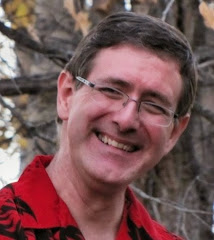How many of you had to carve the turkey last week? What kind of knife did you need? A sharp one.
A heavy one? What would have
happened if you had used a double-edged knife?
I was very surprised when I looked up the word sword in the New
Testament, which is Machaira, which is the root of machete, to discover that it
was not the Gladius used by Roman Soldiers and Gladiators, but more of a general
word that could mean a weapon but also a butcher knife. I’ve never seen a butcher’s knife with two
edges, but I can imagine that it would hurt the person using it if they weren’t
careful.
Our faith is like that.
If we use it as a weapon, we are likely to get hurt. Or to hurt ourselves if we use it
incorrectly. On one hand, it is a great
comfort to believe in a God who loves us.
On the other hand, there are times when our belief leads us to throw up
our hands and cry, “My God, My God, why have you forsaken me?”
The young man found this out the hard way. He wanted a quick trick, an easy list from
Jesus, a tweet or maybe one of those websites that promise 5 easy steps to
erase stretch marks or 7 ways to pay off your mortgage faster, something he
could do that would guarantee God was on his side.
Jesus looked at him and carved him up from the inside out,
saw the truth of him for what the young man was looking for, and rather than
answer him with something easy straight out of an Oprah magazine, he went straight
to the heart of the matter. Obey the
laws about loving your neighbor.
The young man wasn’t happy with that, he wanted more. Maybe he was struggling with a sense of
something missing in his life, maybe he was dealing with a string of bad luck
that left him struggling with his faith.
We don’t know. But for whatever
reason, being a good person wasn’t enough to fill an emptiness he felt in his
soul.
I think we often get caught up in being good people with
good intentions and friendly and nice to everyone we meet, but there are times
when being good is not enough and we need to have someone who can look past the
surface of our good lives to the real issues that are at the bottom of our
discontent. Maybe there are times when
we think we’ve got it all together and can serenely go through life with a
sense of satisfaction until we hit a bump that bewilders us. When we realize that our goodness is only skin
deep.
Jesus challenged the young man with that very question. “Why call me good? Only God is good.” To be human is to be aware that we are not as
good as we might like to think. That’s
what confession is about. We do our best
to be real, honest and truthful to who we are underneath all the surface
stuff. We’re not afraid in church to
say, “My God, My God, why have you forsaken me?”
As C. S. Lewis once wrote, “Many things—such as loving,
going to sleep, or behaving unaffectedly—are done worst when we try hardest to
do them.” Sometimes we have to stop focussing on what we are doing and look at
how and why we are doing them.
The young man wanted a checklist of what to do. Instead, Jesus gave him an idea of how to
be. Be wise with your possessions and
let what you own benefit others and not only yourself. Don’t be a slave to your stuff or your bank
account or your status or your Rsps or your Freedom 55 plan. Be intentional about all you have and do in
terms of God’s vision for the world.
That’s not the most important thing about this story,
though. The most important thing is that
Jesus, our high priest, our two-edged sword, who can cut to the deepest soul
sicknesses we have and carve them out of our lives like a piece of gristle on a
turkey bone, looked this young man squarely in the eye and loved him. Just as he was. How many times have we spoken truth without
love. How many times have we thought we
knew all the truth but found out later we only had a piece of the truth and the
people we were arguing with also had a piece of the truth. We do not own the truth, and we need to be
humble when we think we know the truth.
That kind of attitude too easily falls into arrogance and pride.
The truth is that life can hurt. Jesus also knew what it was like to suffer
doubts and fears. The reason that the
first few words of Psalm 22 sound so familiar is that we read them on Good
Friday. They are among the last words
Jesus spoke, “My God, My God, why have you forsaken me?” Or as the writer of Hebrews puts it, “We do
not have a high priest who is unable to sympathize with our weaknesses.”
Jesus said that all things are possible with God, even a
rich man can enter into the realm of God.
I don’t know, but I like to think that the young man found his way. I wonder, because Paul, when he talked about
himself, would sometimes say, “I know a certain man who had visions” when he
wanted to talk about himself without appearing to brag. Who knows, maybe that certain young man was
Mark himself! I like to think so, for them it means that even he, who thought
it would be impossible to find faith by following Jesus, managed to do exactly
that. May we all find our way into the
realm of God by opening ourselves to the Loving Word who loves us no matter
what.

